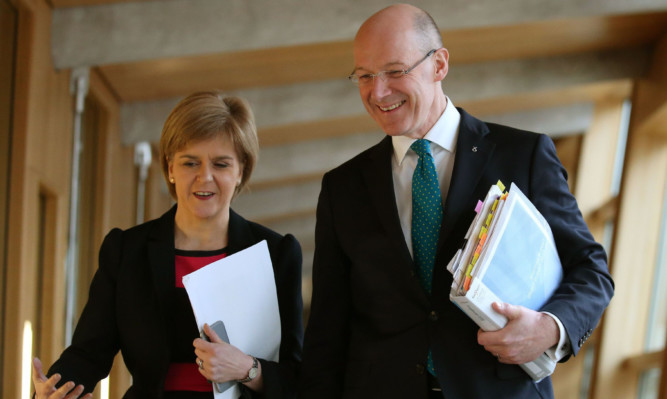Extra funding is being made available to help protect teacher numbers in Scotland, but Deputy First Minister John Swinney has told councils he will “claw back” their share of the cash if they fail to deliver on this.
The Scottish Budget, passed by Holyrood on Wednesday afternoon, includes an extra £51 million next year to help local authorities maintain teacher numbers, £10 million more than had been originally proposed.
The funding is being made available after a drop in teaching staff was recorded last year, while the ratio of pupils to teachers in Scotland’s classrooms increased slightly.
But Mr Swinney told MSPs the local government body Cosla had so far been “unable to agree what I consider to be a fair and generous offer” from the SNP administration on the issue.
https://youtube.com/watch?v=NU8SE-9J_Lo%3Frel%3D0
He said: “When sufficient funding is available to support the employment of teachers it cannot be acceptable that the numbers of teachers declined slightly last year and the ratio of pupils to teachers rose slightly.”
* See full budget coverage in Thursday’s Courier
The Deputy First Minister added that, to help deliver the pledge to maintain teacher numbers, a total of £51 million would be provided in 2015-16.
He added: “In order to protect that investment in teacher numbers, this total resource of £51 million will only be available to local authorities on a council by council basis if they are prepared to sign up to a clear commitment to protect teacher numbers.
“Any council that does not make and deliver on that commitment will not benefit from that funding.”
Cosla chiefs said they were “outraged and appalled” by the Deputy First Minister’s actions, while opposition parties at Holyrood also reacted angrily.
Labour said Mr Swinney had “imposed” a deal on the local government body, while the Tories accused him of using his Budget to create a “turf war with Cosla”.
Cosla president David O’Neill said: “We have been in constant contact with Scottish Government on this issue over the last 10 days to secure a deal and at no time during these negotiations did we walk away.
“Indeed, over the years we have negotiated with Government on much more difficult and pressing issues, and never once have Cosla walked away.
“Only yesterday I advised Mr Swinney that I had called an urgent leaders’ meeting to discuss this issue in two days time. Therefore when he advised MSPs today during his Budget debate that Cosla was unable to reach agreement this was factually incorrect and an entirely misleading description of Cosla’s position.”
Councillor O’Neill branded the move a “blatant attempt” by the Scottish Government to control local councils.
He hit out: “We have consistently argued that focusing on teacher numbers won’t deliver the improvements in attainment that we all desire. The best people to take decisions on education work in councils not in (the Scottish Government headquarters) St Andrews House.”
Labour finance spokeswoman Jackie Baillie claimed the concordat deal the SNP Government reached with local councils was now in “tatters”.
She told the Deputy First Minister one local authority had said the money on offer “doesn’t even cover the advertising bill for new teachers”.
Meanwhile, Tory finance spokesman Gavin Brown accused Mr Swinney of using his Budget as a platform for “creating a turf war with Cosla” with its talk of “claw-backs, of penalties, of ring-fencing”.
The Deputy First Minister insisted to MSPs that both health and education “are at the top of our priorities” for the Scottish Government as he made his Budget speech.
For the first time, spending on the health service in Scotland will total more than £12 billion as he pledged “real investment, not warm words, for our NHS”.
An extra £127 million is being made available for the NHS, taking the total additional spending for 2015-16 to £383 million.
As well as spending £98 million to tackle bed blocking – when patients are forced to stay in hospital despite being well enough to go home because the necessary care is not available – the Deputy First Minister announced a £31.5 million Performance Fund is to be set up next year to “improve quality of care and reduce waiting times”.
The extra cash was revealed the day after new figures showed Scotland’s hospitals had failed to meet accident and emergency waiting times targets in the final three months of last year.
The spending plans for 2015-16 also include an extra £20 million for making homes more energy efficient, taking funding for this to £114 million. In addition, £20 million will go towards tackling educational inequalities and almost £4 million will be spent on improving cycling facilities.
These come on top of previous Scottish Government commitments to invest £4.5 billion for projects such as schools, hospitals, housing and transport next year. Universities will receive more than £1 billion of funding, while colleges will get over £500 million. In addition, ministers will spend £81 million mitigating the impact of Westminster welfare reforms.
With new tax-raising powers coming to Scotland for the first time, Mr Swinney revealed he is holding on to £15 million as “insurance” in case revenues fail to meet his forecasts.
A new levy on property sales, the Land and Buildings Transaction Tax (LBTT) – which replaces stamp duty in Scotland – comes into force in April, at the same time as power over landfill tax is transferred to Holyrood.
Mr Swinney insisted he had taken a “prudent approach” when forecasting how much these would raise, but added: “With tax devolution inevitably comes an increase in the exposure to risk, and I have decided to hold £15 million in 2015-16 to provide insurance against such risk.”
